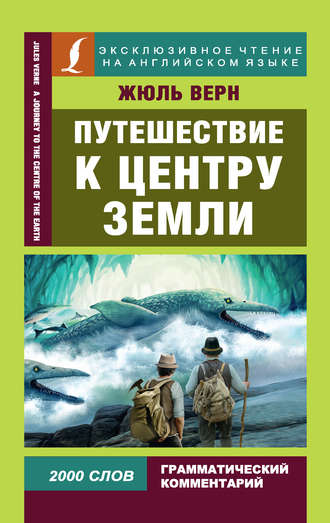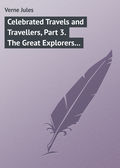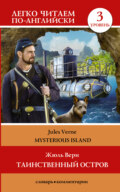
Жюль Верн
Путешествие к центру Земли / A Journey to the Centre of the Earth
8
Altona was the terminus of the Kiel [32]railway, which carried us to the Belts[33]. At half-past six the carriage stopped at the station; my uncle’s numerous packages were unloaded, removed, labelled, weighed, put into the luggage vans, and at seven we were seated face to face in our compartment. The whistle sounded, the engine started, we were off.
My uncle examined all his pockets and his travelling bag to make sure he had not forgotten even the smallest thing. The steamer did not start until night.
At seven in the morning we landed at Korsor[34], a small town on the west coast of Zealand[35]. Three hours’ travelling brought us to the capital of Denmark. My uncle had not shut his eyes all night. I believe he was trying to accelerate the train with his feet.
“It’s all right, it’s all right,” my uncle repeated. “How fortunate we are!”
9
The day for our departure arrived. On the 2nd, at six in the evening, all our precious baggage was safely on board the Valkyria[36].
“How long will the passage take?” my uncle asked.
“Ten days,” the captain replied. “Mr. Liedenbrock, don’t be uneasy, we shall get there in very good time.”
In a week and a half we were finally treading the soil of Iceland.
We stayed at Mr. Fridrikssen’s [37]place. He was a professor of natural sciences at the school of Rejkiavik. This modest philosopher spoke only Danish and Latin. In fact he was the only person in Iceland with whom I could talk.
“Well, Axel,” said my uncle, “and now the worst is over.”
“The worst!” I said, astonished.
“To be sure, now we have nothing to do but go down. Come, there’s no time to lose; I am going to the library. Perhaps there is some manuscript of Saknussemm’s there.”
“Well, while you are there I will go into the town. Won’t you?”
“Oh, that is very uninteresting to me. It is not what is upon this island, but what is underneath, that interests me.”
I went out.
It was not easy to lose your way in Reykjavik. The town extended between two hills. The longest of the only two streets that Reykjavik had was parallel to the beach. Here, in wooden cabins, lived the merchants and traders; the other street ended at the little lake between the house of the bishop and few residential houses. Between the little lake and the town stood a church that was built in the Protestant style[38]. On a hill I saw the national school, where children were taught Hebrew, English, French, and Danish; four languages of which I didn’t know a single word.
After a walk I returned to Mr. Fridrikssen’s house, where I found my uncle already in his host’s company.
10
During the dinner the conversation was carried on scientific questions. In the first place, Mr. Fridrikssen wanted to know what success my uncle had had at the library.
“Your library! There is nothing but a few books upon almost deserted shelves.”
“Indeed!” replied Mr. Fridrikssen, “We possess eight thousand volumes, many of them valuable and scarce, works in the old Scandinavian language, and we have all the novelties that Copenhagen sends us every year.”
“Where do you keep your eight thousand volumes?”
“Oh, Mr. Liedenbrock, they are all over the country[39]. In this icy region we are fond of different studies. There is not a farmer, nor a fisherman, that cannot read and does not read. These volumes are passed from one to another, read over and over, referred to again and again.”
“And in the meantime,” said my uncle, “strangers—”
“Well, foreigners have their libraries at home. Now, will you be kind enough to tell me what books you hoped to find in our library?”
“Monsieur Fridrikssen, I wished to know if among your ancient books you possessed any of the works of Arne Saknussemm?”
“Arne Saknussemm!” replied the Reykjavik professor. “You mean that learned sixteenth century savant, a naturalist, a chemist, and a traveller?”
“Just so!”
“One of the glories of Icelandic literature and science?”
“That’s the man[40].”
“Whose courage was equal to his genius!”
“I see that you know him well. Well, where are his works?”
“His works— We have them not.”
“What— Not in Iceland?”
“They are neither in Iceland nor anywhere else.”
“Why is that?”
“Because Arne Saknussemm was persecuted for heresy and his books were burned in 1573.”
“Well,” replied my uncle, “I mean to begin my geological studies, there on that Seffel— Fessel— What do you call it?”
“Sneffels,” replied Mr. Fridrikssen.
“Yes,” said my uncle, “We will try to scale that Sneffels; perhaps we even may pursue our studies in its crater!”
“I very much approve of your beginnings with that volcano, Mr. Liedenbrock. You will gather a harvest of interesting observations. But tell me, how do you expect to get to the peninsula of Sneffels?”
“By sea, crossing the bay. That’s the most direct way.”
“No doubt; but it is impossible.”
“Why?”
“Because we don’t possess a single boat at Reykjavik. You will have to go by land, following the shore. It will be longer, but more interesting.”
“Very well, then I shall try to find a guide.”
“I have one to offer you.”
“A safe, intelligent man?”
“Yes; an inhabitant of that peninsula. He is an excellent hunter, and very clever. He speaks Danish perfectly.”
“When can I see him?”
“Tomorrow, if you like.”
“Why not today?”
“Because he won’t be here till tomorrow.”
“Tomorrow, then,” added my uncle with a sigh.
11
When I awoke I heard my uncle. He was talking in the next room. I immediately dressed and joined him.
He was conversing in the Danish language with a tall man of robust build[41]. This fellow must’ve possessed a great strength. His eyes seemed to me very intelligent; long hair fell upon his broad shoulders. He listened to the Professor and stood with arms crossed.
This grave, phlegmatic, and silent man was called Hans Bjelke[42]; he was the one Mr. Fridrikssen had recommended to be our future guide.
Hans agreed to conduct us to the village of Stapi[43], on the south shore of the Sneffels peninsula, at the very foot of the volcano[44].
The start was fixed for the 16th of June. My uncle wanted to pay the hunter a portion in advance, but he refused with one word:
“Efter,” said he.
“After,” the Professor translated for me.
We began to pack every article. The instruments were: a thermometer, graduated up to 150 degrees; an aneroid barometer[45], to indicate extreme pressures of the atmosphere; a chronometer; two compasses; a night glass[46]; two of Ruhmkorff’s apparatus[47].
Moreover, we had two rifles and two pistols.
And there were provisions too; spirits were the only liquid, and of water we took none; but we had flasks.
“Equipped like this,” said my uncle, “we may go very far.”
12
We got out of Reykjavik.
“Where’s the risk?” I said to myself, “Here we are travelling all through a most interesting country! We are going to climb a very remarkable mountain; at the worst we are going to scramble down an extinct crater. It is evident that Saknussemm did nothing more than this. As for a passage leading to the centre of the globe, it is mere rubbish! Perfectly impossible!”
Hans moved steadily on. The baggage horses followed him without giving any trouble. Then came my uncle and myself.
Iceland is one of the largest islands in Europe. Its surface is 14,000 square miles, and it contains 16,000 inhabitants. Geographers have divided it into four quarters, and we were crossing diagonally the south-west quarter, called the “Sudvester Fjordungr[48].”
We were advancing at a rapid pace. The country was already almost a desert. Here and there was a lonely farm, built either of wood, or of sods, or of pieces of lava, looking like a poor beggar by the wayside. In this country there were no roads and paths.
In two hours from Reykjavik we arrived at the burgh of Gufunes[49]. There was nothing remarkable here but a few houses.
Hans stopped here for half an hour. He shared with us our frugal breakfast and answered my uncle’s questions about the road and our resting place that night with merely yes or no, except once, when he mentioned a place: Gardär[50].
I consulted the map to see where Gardär was. I saw that it was a small town, four miles from Reykjavik. I showed it to my uncle.
“Four miles only!” he exclaimed; “Four miles out of twenty-eight. What a nice little walk!”
13
I was cold and hungry. Finally, we reached a peasant’s house. The master came out with outstretched hands, and without ceremony beckoned us to follow him.
The kitchen chimney was constructed in the ancient pattern: in the middle of the room was a stone for a hearth, over it in the roof with a hole to let the smoke escape. The kitchen was also a dining-room.
At our entrance the host greeted us with the word “Sællvertu”, which meant “be happy,” and kissed us on the cheek.
After him his wife pronounced the same words; then the two placing their hands upon their hearts, inclined profoundly before us. This Icelandic lady was the mother of nineteen children, nineteen unwashed angels.
We sat at table, twenty-four in number, and therefore one upon another. As soon as the meal was over the children disappeared.
At five next morning we woke up; and Hans signalled the start.
At a hundred yards from Gardär the soil became boggy and less favourable. The desert became wider and more hideous. We had to cross a few narrow fiords, and at last quite a wide gulf; then we reached the village of Alftanes[51], one mile beyond.
On the 19th of June, for about a mile, that is an Icelandic mile, we walked upon hardened lava; this ground is called in the country “raun”.
At six p.m. on the 20th of June we reached Büdir[52], a village on the sea shore; and there the guide claimed his money.





